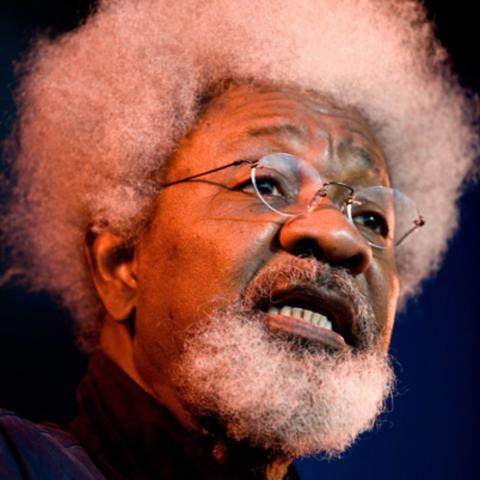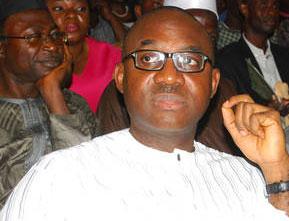
At an age when no territory seems restricted anymore, when many yesterday’s heroes and heroines have been exposed to be counterfeits, when more and more of the surviving statesmen would rather trade away their honour for temporary gains, Kongi remains an exemplary, distinguished from the multitude by his trademark hoary mane accentuated by an equally immaculate goatee.

The cell-phone beeped frantically. With the caller ID with-held, it was easy to surmise that it was either a foreign call or someone preferring anonymity. Pressing the receive button, my hunch was dead right. The baritone voice was unmistakable: it was the literary lion himself roaring from his den on the other side of the Atlantic.
“Hey Louis, what’s the trouble at home this time?,” he teased in his accustomed patriarchal flourish.
“Good day, Prof,” I responded and, excited that my repeated dials had finally paid off, quickly switched to the sarcastic mode Kongi had set. “It’s Maradona again o. Of all the idle pensioners left in Nigeria, the NLNG people just declared that he’s the only one fit to give keynote address at the next Prize ceremony.”
Indeed, heavy dust had been raised earlier on this day in September 2007 following the unveiling of General Ibrahim Babangida as the lead speaker at the exclusive shindig, to which the who’s who in Nigeria’s literary community get invited annually.
As editor of Sunday Sun then with a robust literary section, this writer was urgently seeking Professor Wole Soyinka’s comment, to set the agenda ahead of the presentation ceremony scheduled for the following weekend.
Without mincing words, Kongi released the expected bombshell: “Abominable!!”
His logic was simple: having been linked to the unnatural deaths of a few literary celebrities as military dictator and having presided over an order that flagrantly stifled free speech, it was simply unacceptable that the microphone be yielded to the former military dictator at a ceremony intended to celebrate the spoken or written word.
To him, that amounted to dancing on the graves of the likes of poet Mamman Vatsa (a military general summarily executed over the alleged 1985 military coup despite passionate pleas from the nation’s leading writers including Soyinka) and Dele Giwa (celebrated journalist dispatched by a letter bomb on October 19, 1986).

Almost breathless with rage, Soyinka said: “I call on ANA (Association of Nigerian Authors) to boycott the NLNG Grand Award Night unless the organizers reverse themselves on the choice of General Ibrahim Babangida as keynote speaker, mindful of his antecedents. His choice is an affront on intellectuals in the country.
“NLNG has the right to invite whoever it pleases. It should also be understood that ANA, as a democratic institution, reserves the right to boycott. Saying that invitation extended to IBB is in the exercise of freedom of expression is a distraction. It is agreed that freedom of expression is consistent with democracy. Let it also be noted that ANA has, in this regard, a responsibility of action against the man who destroyed democracy in the country, whose policies stifled intellectual growth.”
With such thunderous denunciation by Kongi, yours sincerely was left salivating with some malicious pleasure at a steaming exclusive and did not think twice before making it a front-page story with the headline, “NLNG Award: Soyinka moves against IBB.”
Predictably, Soyinka’s eruption instantly triggered a concatenation of lightning and thunder across the land. Literary icons like Professors Niyi Osundare and Okey Ndibe added to IBB’s misery with their barbs. There were a few dissenters, however. At the end, the 2007 edition of the Literature Prize organized by the Nigerian Liquified Natural Gas was completely overshadowed by the debate on the propriety or otherwise of inviting a military dictator to a literary feast.
Fleeting as it may seem, the foregoing anecdote nonetheless speaks to one fact: another confirmation of Professor Akinwande Oluwole Soyinka as the conscience of a nation blighted by vanity and amnesia, with a deep moral voice whose resonance not only sends fear into the hearts of men of power but also inspires generations of men and women to stand up and be counted for good.
By and large, what truly makes Soyinka great is not so much for the monumentality of a talent that spews pithy poetry, gripping prose and transcendental drama. His greatness lies more in the courage and character he brings to bear in creativity.
At an age when no territory seems restricted anymore, when many yesterday’s heroes and heroines have been exposed to be counterfeits, when more and more of the surviving statesmen would rather trade away their honour for temporary gains, Kongi remains an exemplary, distinguished from the multitude by his trademark hoary mane accentuated by an equally immaculate goatee.
My early contact with him was through the channel of the written word. Beginning from secondary school, to the polytechnic and later the university, I read tons and tons of Soyinka's works to find my own feet as a writer. As many students will attest, Soyinka’s poems were a source of dread and torture.
But the Kongi I would later encounter as journalist was a pleasant man. Despite his world celebrity status, his humility is very numbing and, as the good teacher, he never allows any opportunity to mentor the younger ones pass.
As one of the pioneers of THISDAY back page back in mid-90s, this writer was introduced to him by a professional ‘egbon’ (senior), Dr. Yemi Ogunbiyi, during a flight to Abuja from Lagos.
“Oh, your face is already familiar,” he said, offering me a handshake. “You’re one of those I read on THISDAY back page.”
Coming from the owner of the word himself, the Nobel laureate, a famous name I grew up worshipping, I felt completely flattered that my own little juvenile jottings made some sense to Soyinka. I took his contact and tried to stay in touch. Thus began a relationship that grew from acquaintanceship to discipleship. He has a natural affinity, instinctive solidarity with anyone in the writing fraternity.
I have seen him deploy his awesome clout to extract better deals for fellow writers. While delivering a keynote address at the inaugural edition of the NLNG Prize for Literature many years ago, Soyinka had tactfully bad-mouthed the organizers for being too “stingy” by the amount set aside as the Prize money in view of the “fortune you daily amass from the soil of Niger Delta.”
In clear breach of protocol, he thereafter unilaterally declared that in the exercise of his “natural powers” as the “defender of writers” the amount was upped from 10,000 to 30,000 US Dollars. The Kongi’s coup elicited a standing ovation from the galaxy of writers gathered in the expansive hall that night. The rapturous applause continued when his speech ended. Reading the mood in the audience correctly, NLNG’s MD had little or no choice than announce the approval of Soyinka’s proposal.
To the younger ones like yours sincerely, Soyinka’s father-figure stature naturally makes him a guardian. But despite the wide age difference, Kongi also relates to you as a friend with incredible sense of humour. During one of his frequent visits to Nigeria, he gladly consented to an interview request I made. The only problem was time, because he had several speaking engagements already lined up.
Finally, he decided to squeeze out time in-between a lecture at the National Arts Theatre, Lagos.
On the D-Day, we were already more than thirty minutes into the session when I suddenly noticed that the tape-recorder was stuck. My heart skipped with embarrassment. I quickly demobilized the gadget and played back. Lo, not a single word was recorded!
“Haba! Louis, shame on you. You mean a journalist of your standing still carries around a counterfeit recorder,” he teased, without the slightest sign of irritation that his precious time had been wasted on account of an avoidable mechanical malfunction. Graciously, he accepted we begin afresh.
His fiery pen and caustic tongue notwithstanding, Kongi remains tender at heart; one who may disagree with you in principle, but never holds back in the fellowship of humanity or be detained by bitterness over the past. Only that could possibly explain the complicated relationship he has had over the years with his kinsman, ex-President Olusegun Obasanjo.
Feisty OBJ had decided to veer from the political turf as sitting president in 2005 to engage Soyinka in an epistolary joust. In a statement he personally signed, he took a swipe at Kongi for criticizing his policies.
But discerning observers who read the open letter could not but raise their hands in panic immediately, fearful of the approaching literary wrath on the proverbial errant native doctor who carries his ritual offering past a mosque.
While it was easily conceded that OBJ was cantankerous by nature, many had expected that his fabled native intelligence would have served him well by dissuading him from venturing into a square rope against Kongi in a literary duel.
Their worst fears were soon proved right. Soyinka’s response was an atomic bomb. By the time the smoke cleared, OBJ’s presidential garment was torn beyond recognition. For once, the Ota chicken farmer became tongue-tied. Months later, the animus that open ‘roforofo’ (dirty fight) had generated would not prevent Kongi from showing up at the funeral of OBJ’s spouse, Stella, who died suddenly following complications arising from a medical procedure in Spain.
When OBJ finally met with Kongi face to face on the aisle outside the funeral parlour, the story is told of how the president exploded in a playful rage, ‘Wole, iwo! (Wole, You!)’, raising an arm in mock threat. Defiant Kongi fired back, “Segun, Ori e!”, thumping his own head in a supreme Yoruba gesture of contempt.
Obviously more embarrassed than amused by such show of audacity, the band of guards around the President cleverly looked away.
Again, when Chief Emeka Ojukwu qualified the victory he achieved in the sham elections arranged by the Abacha junta to select delegates for the 1994 Constitutional Conference as conferring on him a mandate “superior to June 12”, vintage Soyinka gave expression to popular thinking in the country then by simply dismissing the ex-Biafran secessionist as “an expired warlord”.
That critical riposte would not prevent Kongi from attending Ojukwu’s burial in 2012 to pay last respect to a personal friend.
Same generosity of spirit is very much in evidence in his warm relationship today with General Yakubu Gowon. At the presentation of a memoir by Oba Eradiuawa of Benin in 2014, Soyinka continually poked good-natured jokes at Gowon while giving a keynote address, to the admiration of the audience. It was hard to believe that it was same Gowon who had clamped him into the gulag during the Nigerian civil war. In fact, his 20-month solitary confinement birthed the book, “The Man Died”.
When it was his turn to speak, the former head of state threw the crowd into a fresh bout of laughter by cautioning Kongi to watch his tongue: “You should remember that it was because of the same sharp tongue of yours that I sent you to prison in the 60s.”
Being the first black man to win the Nobel Prize in Literature, Soyinka’s life surely sends an enduring message: the infinite possibilities of the black race and the value in character. Here is wishing him happy 85th birthday.